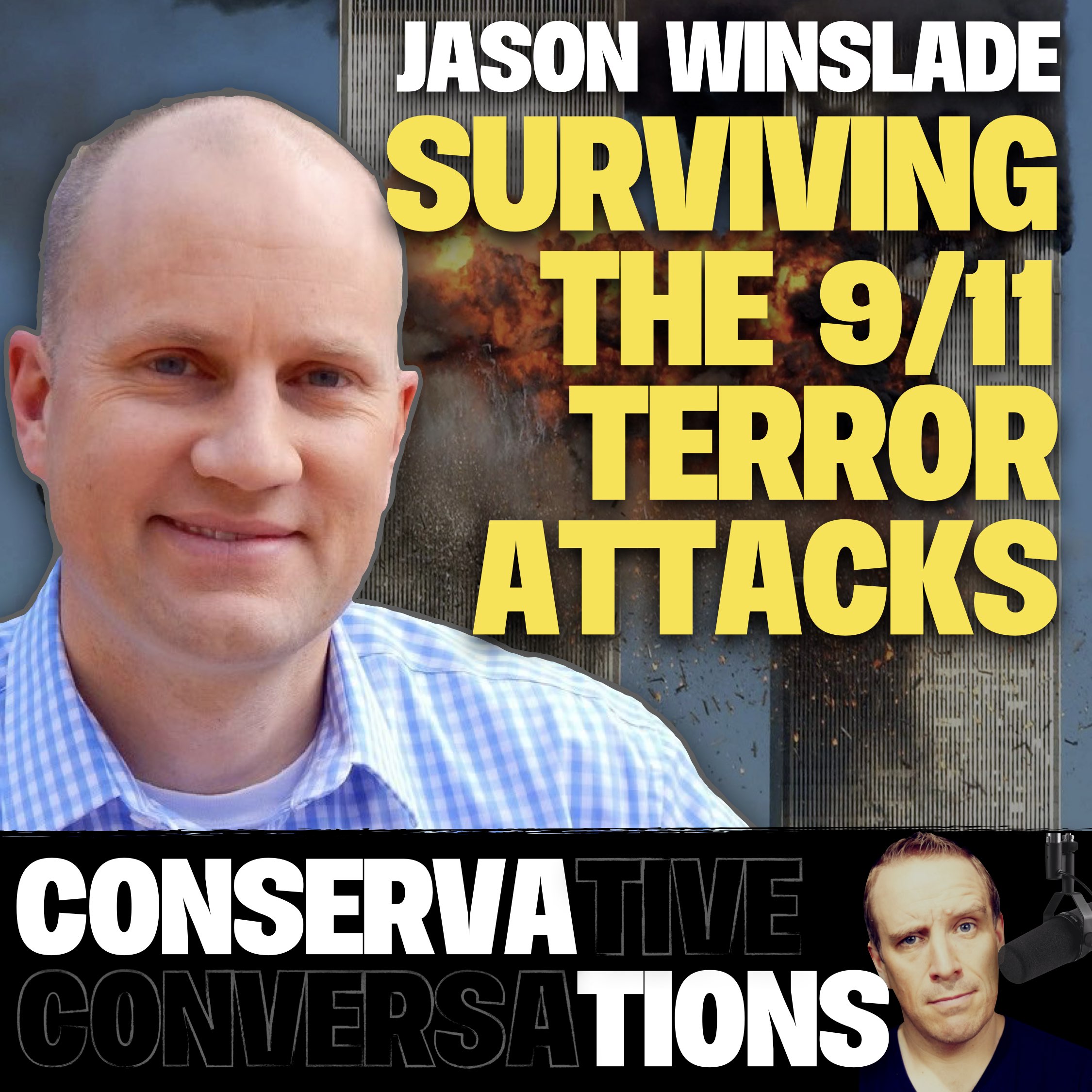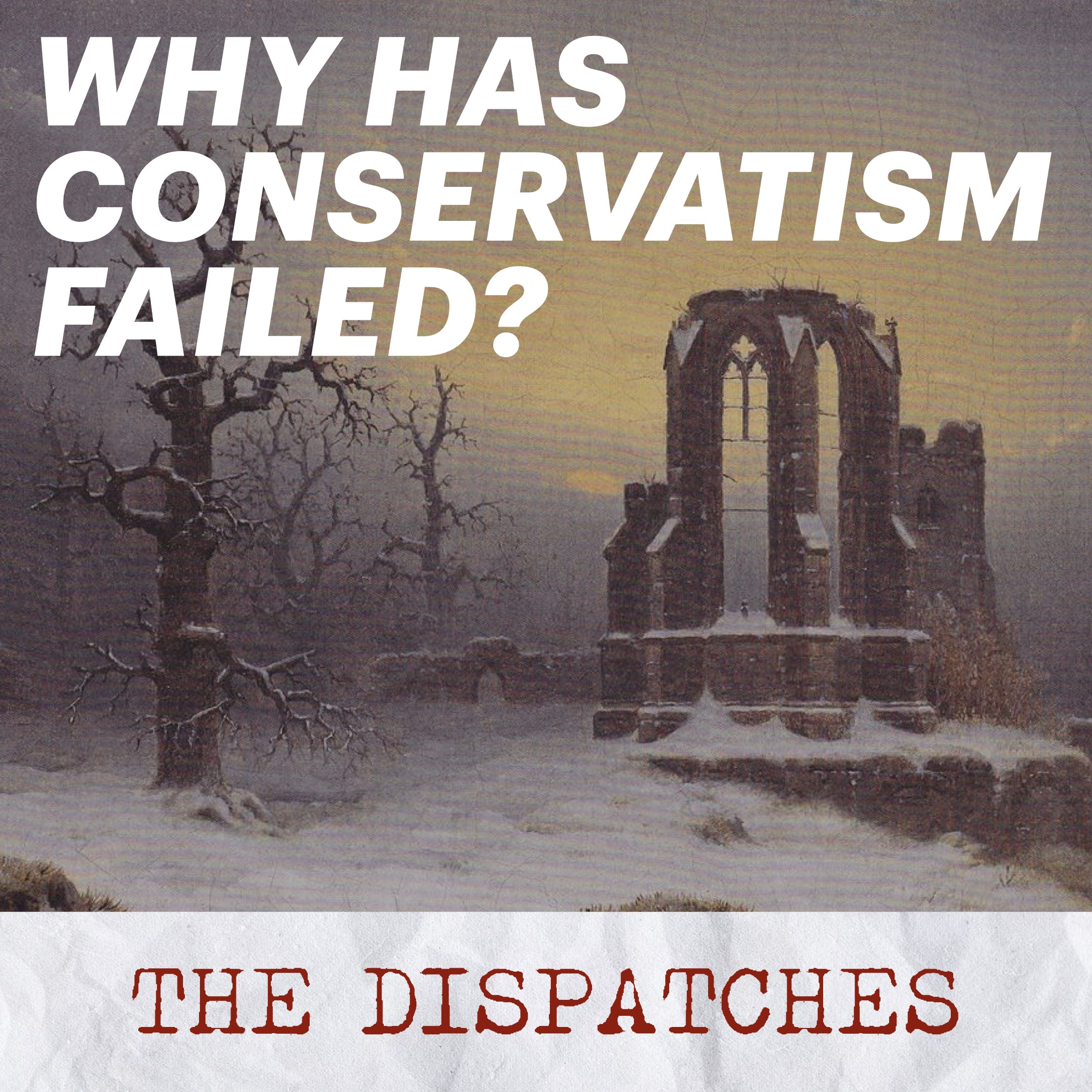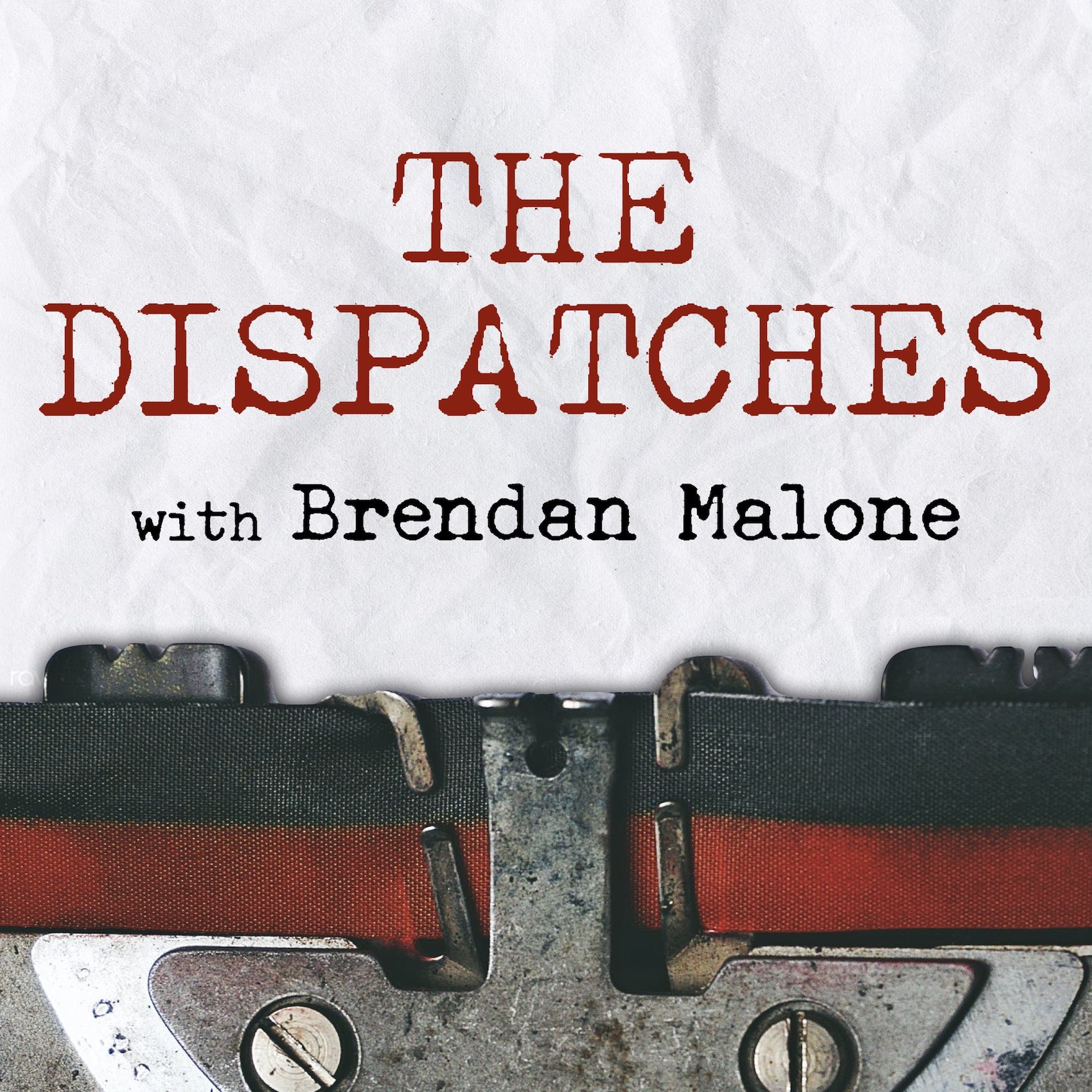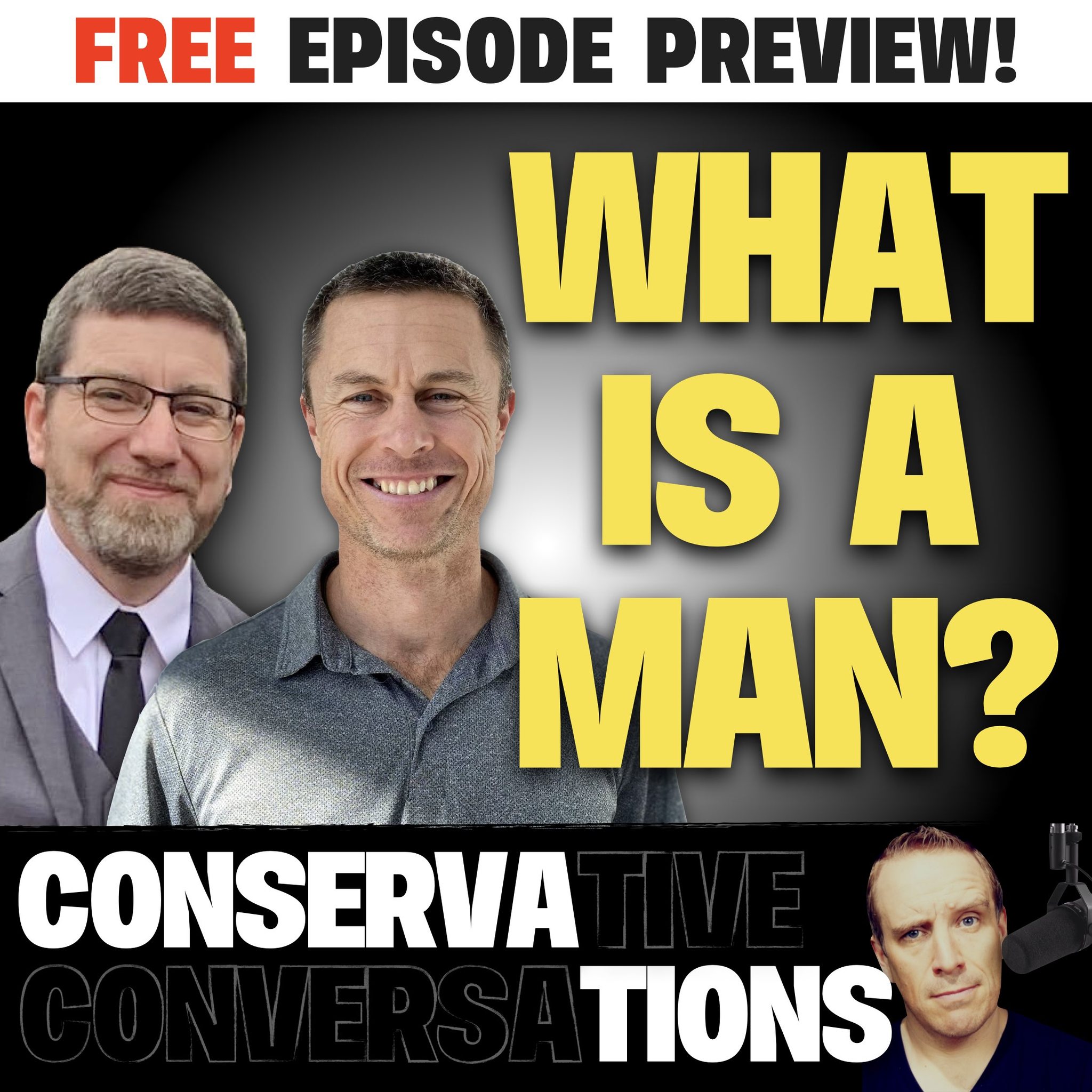[00:00:00] Speaker A: Hi, everybody. Welcome along to this special preview snippet of our monthly Conservations Interview podcast. Conservations, of course, being short for conservative conversations. And in this episode, I had the absolute privilege of speaking to someone I know as a friend. His name is Jason Winslaid, and in this episode, he talks about and shares his experiences of being present in New York City at Ground Zero at the base of the World Trade Center on September the 11th, 2001. That awful Tuesday morning when everything changed, not just for America, but for the whole world. And it's not just a story about someone who saw and witnessed firsthand terrorism up close and personal. It's also a profoundly beautiful story about a moment which begins a journey of conversion and redemption in his life and brings him to a place of healing and wholeness and meaning and purpose in his life that he never probably imagined he would find before that. So there's a whole lot wrapped up in this one, and it's a really special episode. If you want to hear the full conversation, this is only just a preview snippet, but if you want to hear the full 1 hour and 18 minutes episode, all you have to do is go to Patreon.com Left Footmedia the link is in today's Show Notes and become a $5 monthly patron. Our $5 monthly patrons get access to all of our patrons only content, which includes these Conservation Interview episodes each month, and also our regular weekly that's twice a week patrons only podcast episodes on culture and current affairs. It's definitely really good value for money. So to become a patron, as I said, go to Forward slash Left Foot Media, or the link that is in Today's Show Notes can be used and you can now access all of those episodes, those patrons only episodes directly on your Spotify app now. So it's nice and easy too for listening as well. So do that at Foot Media. In the meantime, enjoy this free preview snippet of this month's episode of Conservations.
Welcome to Conservations, the podcast which got its name by literally combining the words conservative and conversations, which is exactly what happens on this show. Every month. Each episode, we host a conversation with at least one other guest where we go in depth on a topic or hear about their experiences on this journey we all share together called Life. The aim of this show is to foster and promote dialogue which cultivates goodness, truth and beauty, and in doing so, unpacks the richness of the authentic conservative tradition. My hope is that you'll find these conservative conversations intellectually engaging and enriching, and that they will draw you ever more deeply into an authentic, truly flourishing and more meaningfully lived human experience. In this month's episode, we're going to be talking with Jason Winslaid, who lives in Canterbury with his wife Claret and their six children. Jason previously had a corporate career before hearing the call to ordained ministry as a Protestant pastor. He has been pastoring a Reformed Baptist congregation in Christchurch for the last 14 years. And when he's not busy with pastoral responsibilities, he and Clarette are home educating their six kids. And in this episode, we're going to be hearing Jason's personal story of being present at Ground Zero in New York on September 11, 2001, as the 911 terrorist attacks unfolded immediately above and around him. But this isn't just a personal account of surviving one of the most harrowing and deadly terror attacks in US. History, an event which claimed 2993 lives and injured almost 9000 others. It's also a powerful story of the path to conversion and redemption for a young man who discovered in the horror and fear unfolding around him outside the World Trade Center on that warm September morning that there was more. To life than career and a hedonistic search for self fulfillment. And that being ready for death meant a journey into the much grander, transcendent and truly sacred vision of reality that Christianity offers to the world. So, having said all of that, let's have this profoundly important conservative conversation with Jason Winslaid.
Jason, thank you so much for being here to have this conversation.
It's awesome for a couple of reasons. Number one is because it's just an event that was so central to your life. I know. And I'm looking forward to sort of introducing our listeners to that aspect of who you are. Secondly, because I consider you someone who's a friend, and it's always good to have a dialogue with someone you're a bit more comfortable with.
And I think, obviously, the timing we're in September.
It is the anniversary of the September 11 attacks and very close to when we're recording now, only a few weeks away. And so it seemed appropriate to talk about this. So let's start right back at the very beginning before we even get into the events of that particular day, because you were there when the planes hit those towers, but what were you actually doing? This kiwi, lad. You're 23.
[00:05:46] Speaker B: Yes.
[00:05:47] Speaker A: You're in New York. What is a 23 year old Jason Winslay doing in New York?
[00:05:53] Speaker B: Well, first of all, I just want to say that note that you've actually given away my age, if anyone wants to do the math. So don't get out your calculator.
[00:06:00] Speaker A: Never ask a lady his.
[00:06:05] Speaker B: Kiwi. Born and bred. I studied at Massey, graduated there. I was working for an investment bank, share brokerage company.
[00:06:12] Speaker A: Was that your qualification? You studied in and went to correct?
[00:06:16] Speaker B: Yeah, I studied it and finance at Uni and then got straight into an investment bank and share brokerage company in my very early 20s down in Wellington. And then not too long after that, I went over to the States. And I guess the motivation behind that was really to know a bigger job, better job, and certainly the financial district of Manhattan was certainly one of the main places to go.
[00:06:41] Speaker A: So I was going to ask you, was that this like the I don't know, I guess the painter who wants to go to Venice and study painting or the person who wants to study medicine at Harvard? Is this the financial district where you feel this is the Mecca of your profession?
[00:06:57] Speaker B: It really was, yeah. And I guess my thinking back then, my motivations weren't particularly pure. It was greed, it was prestige. And certainly you could get a lot further afar ahead in your career and financially working in Manhattan.
[00:07:13] Speaker A: Did you ever watch Gordon Gecko? Greed is good. Wall street. Did you ever watch that original film.
[00:07:19] Speaker B: Or was that not quite that was I think I may have watched it after.
I didn't see that before.
[00:07:25] Speaker A: That's so funny because I remember when that was a big thing and it was like this sort of elite Nietzschean sort of strong man who just took whatever finances they want from whoever the weak were around them and it was all business and you're either a powerful player or a sucker who doesn't deserve to be in. It was really awful, wasn't it? Really that barbaric world?
[00:07:45] Speaker B: Yeah, well, that was very much a reality for many who would go into that kind of industry.
[00:07:50] Speaker A: So how long had you actually been in New York at that stage? You moved over there, go to Mecca to have your big religious financial pilgrimage. How long had you been there and working in the Manhattan financial district?
[00:08:02] Speaker B: Yeah, about six months at that point. So I'd been there probably a little bit longer doing a little bit of travel and spending time with extended family members that were over there. But yeah, about six months at that time.
[00:08:13] Speaker A: Did you know anybody over there or did you meet people over there? Did you have friends with you?
[00:08:16] Speaker B: Yeah, not right in Manhattan itself, but I have relatives over there. So my mother's from the States, she was born in the States, which, by the way, gave me my US. Citizenship and passport, which meant that I was able to go and work without any red tape to have to get through.
[00:08:32] Speaker A: That's pretty awesome. And so you're going into work each day and what are you doing? What is your daily routine like when you go to work? Are you sell, sell, sell. Bye bye. Bye. Are you negotiating deals? What are you doing?
[00:08:45] Speaker B: No, so I wasn't in stocks or anything like that. It wasn't share market stuff. I was working for an It company and that It company, it specialized in trade finance systems. And so this is when back in that time, they were automating the whole trade finance process. And so there would be software development for companies who doubt and trade finance and we would do that in house. But then we'd have to go to the actual companies themselves to go and implement the designs for them. Basically, computer systems, and there were customers all over the place. So I would spend about maybe probably two thirds of the time in the office and about a third of the time outside of the office. I was obviously a junior, 23 years old, so I was just following the seniors and being the coffee boy and what have you, but many of our clients were in the World Trade Center. So my work at that time was about two blocks it was on John Street, about two blocks away from sort of larger blocks away from the World Trade Center, and many clients were in there. So it wasn't unusual on any given week or any given day to actually be going into the World Trade Center.
[00:09:56] Speaker A: Yeah, I was going to ask, so you actually spent a bit of time in that building, correct?
[00:09:59] Speaker B: Yeah.
[00:09:59] Speaker A: What was it like? Because it looks from the outside, and I remember as a young lad, it just looked like this sort of very impressive or two monoliths, really, weren't they, to sort of, I guess, the American financial and industrial prowess. It looked like a pretty impressive building to be in.
[00:10:15] Speaker B: It was it was kind of the man made version of, say, going know Arthur's Pass for know. You're going through the mountains and you feel really small because these mountains around you are huge. Well, this was kind of like the man made version of that. You kind of look up and you feel so insignificant compared to these monster towers.
[00:10:33] Speaker A: Was there a status within the building? Like the elites had the top floors and you sort of worked your way down. Do you remember how high maybe you ever got in that building?
[00:10:41] Speaker B: I got to the very top because not for work wise, but you could get up from memory. You could get right to the very top. And there was sort of a lookout area for people to go up, spectators and so forth. So they knew that there would be interest. They knew that tourists would want to come. And so there was allowance for that in terms of the status, prestige. I wasn't privy to that. Remember, I'm a 23 year old coffee boy, so to speak. I'm entry level, so I wasn't privy to any of that kind of stuff.
[00:11:11] Speaker A: Nobody knows your name just yet.
Tell me, what was it like? By the way, folks, if you hear noise in the background, we've got the door open here today in my office, just a bit warmer finally in Canterbury. So there's a blind that every now and now and then rattles against the wall, and there's a bit of the neighbor's dog you might hear as well. But you go to work that morning, the morning of the attacks, you get on the subway, do you, to go to work each day?
[00:11:40] Speaker B: Correct.
[00:11:41] Speaker A: And you get in.
When did you realize something was amiss? Was it when you got off? Was it when you were coming in, you started to hear news when's the moment I guess you're starting to realize something's going on here.
[00:11:51] Speaker B: Yeah, well, immediately getting off the subway, really? I lived over in Jersey City, which was just across the Hudson River, and like, only just across the I was, you know, just a stone's throw. And the accommodation over there was so much cheaper than in Manhattan. Probably like a 10th of the be. I could be at work through the subway. I could be at the World Trade Center in less than five minutes from where I live. So I was very close. Even though I was officially living in New Jersey, I worked down in Lower Manhattan there.
[00:12:22] Speaker A: How long did that take you to get in each.
[00:12:27] Speaker B: Last on my commute to work, the stop where I'd get off was basically in the basement of the World Trade Center. So that was my place where I'd get off. I'd then come up to ground level, and I'd walk several blocks down to John Street, and that's where my work was.
[00:12:42] Speaker A: So you could be there in, what, 1015 minutes from home you got on.
[00:12:46] Speaker B: The subway, sometimes even less.
[00:12:48] Speaker A: Wow. So you're pretty close. And so when do you realize something's amiss?
[00:12:52] Speaker B: Yeah, so on that morning it's funny, I was taking a slower morning. We were on kind of glide time as work. A lot of the corporates were like that you could come in a bit later if you wanted to, finish a bit later if you wanted to as well. I was actually a little bit later that morning, so it must have been I can't remember what time, but it was somewhere between 845 09:00 and basically when the doors opened of the subway that's immediately I knew something wasn't right because there were officials and I don't recall, for some reason there were officials that were wearing official uniforms of some sort. Not military, but some maybe security or something. They were basically down there and shouting at everyone, as soon as the doors open to get upstairs, get upstairs as fast as you can. Go. Go.
[00:13:38] Speaker A: Get out of the building.
[00:13:39] Speaker B: Get out of the building.
And that's all we knew at that point.
[00:13:45] Speaker A: And I guess this is amazing because we really take this for granted today, the age of cell phones and social media. People probably would have known before the train had even stopped now. But you get out and you're in this sort of shock and awe moment. And had the first plane hit at that stage, correct?
[00:14:00] Speaker B: Yeah. So the first one had gone, but.
[00:14:03] Speaker A: You didn't know that.
[00:14:04] Speaker B: I didn't know it was a plane at first. When I got up to ground level and looked out, I could see huge fire up really quite high, and was just observing that at that point.
[00:14:17] Speaker A: What does that look like?
You could actually see, I guess, smoke and flames.
[00:14:23] Speaker B: Oh, yeah. You could see there was lots of smoke, and you could actually see flames as well.
You could see it was actually spreading quite a bit as well. And I remember thinking to myself, well, this is New York City.
There's a fire. It doesn't look good, but hey, New York City, someone will be able to take care of it. It didn't feel initially like it was something that was way out of control, even though it was quite significant.
[00:14:48] Speaker A: Yeah, it's interesting. I was going to ask you that because I guess the gravity of it must slowly sink in.
[00:14:54] Speaker B: Well, yeah. And I think for me, the gravity started to sink in when I was looking up, and then when I started to see people jumping out of the buildings at that point, I think so.
[00:15:04] Speaker A: You actually saw that, correct.
[00:15:06] Speaker B: Yeah.
[00:15:06] Speaker A: Wow.
[00:15:07] Speaker B: And multiple people coming jumping out. At that point, when I started to see, I could see people waving. And I think you see that on the video recordings, people waving from the buildings. But then when I actually started to see people jump and just that just it was a long way up, too. I don't even think that some of the videos do it justice. Like, you're watching a person, a human being, flipping around and round in circles, flying down through the air, and it's not a quick process. I can't remember how many seconds, but it was still a number of seconds that you're watching this person fall down to their death. And I think at that point, I realized, actually, this is not just a fire that someone can take care of. There's some serious casualties that are happening because of it.
[00:15:49] Speaker A: Yeah, I remember reading something about this some years ago because I've heard people give these woefully inadequate sort of attempts at sort of trying to make moral justifications around why they know taking your own life would be okay. And they often compare to the World Trade Center. They talk about Euthanasia, for example, and they go back to that incident. But apparently the psychology of it is that people, when they do that, they reckon the majority aren't actually taking their own lives. What they're doing is they climb out to the very edge away from the fire. They climb as far as they can, and then what happens is the intensity of the fire, it's just an escape ball at that point. You know, the fire is coming for you. And they literally engage in this totally irrational, but in another sense, sort of kind of makes sense process, where they think, well, I've got nothing left to lose. Maybe if I jump, I could survive, sort of thing. It's like it's not like I want to end it. They think I'm getting away from the fire, and they just go as far as they can, which is off the edge of the building, literally.
[00:16:44] Speaker B: Yeah, I agree. It's hard to put yourself in that position and sort of think if you had another ten minutes before the flames kind of got to you, that you would jump ahead of time. You would think that people were at the very end and they said, you know what, I'm literally getting burnt here.
To alleviate the burning, I'm going to have to eject myself out of this building.
[00:17:04] Speaker A: Yeah, it's man, it's crazy.
So you see the fire and then you're looking up and you are there before the second plane. You see the second plane coming?
[00:17:15] Speaker B: Yeah, that's right. So I can't remember how long I was there just looking up. I mean, people were looking out.
It was horrible. It was a horror in real life, looking up. And I still remember during that time, I remember hearing kind of big explosions in the background and I remember just thinking to myself, what is that? There's something echoing through the streets. And it didn't really dawn on me too much at the time. I just thought, wow, I don't know what that is. But I was too fixated on people jumping out of the building and the fire and the fire expanding as well. But I remember watching one that was actually really quite close to me where I was. I was literally just across the road, so there's only a little street that was separating me from the World Trade at that point, and just watching a person go and come all the way down. And basically when they hit the bottom, I heard the explosion.
[00:18:07] Speaker A: Oh my God.
[00:18:07] Speaker B: And I realized at that point, this explosion, this sound of the explosion that was sort of echoing through the smaller streets of lower Manhattan there, these were actually people dropping and hitting the ground. And as soon as I realized that, all of a sudden I could hear explosions happening very frequently, like just going off one after another after another. And I remember thinking at that point, these are lives that are being lost with every explosion that we hear right now.
[00:18:34] Speaker A: Did that ever haunt you afterwards?
Do you ever come back to that moment in the days afterwards? Because I imagine there's nothing like that sort of awful. I mean, no one wants to have that sort of PTSD moment.
[00:18:49] Speaker B: Well, I don't know if we want to talk about matters of faith following that, but I remember not being a Christian, not having faith, but I remember saying audibly, actually, out loud, I said, God, do something. Not loud, but enough just to look up there. And I remember just, I think at that point and I realized how many people were dying. Just said, God, do something.
For me at the time.
I don't know how much I thought about that afterwards in terms of the people who actually died, but it did get me at a later stage following the event. In the months that followed really got me thinking about matters of eternity. It got me thinking about life and death and what's beyond the grave. It did get me thinking about that.
[00:19:34] Speaker A: At the later stage, we'll come back and talk with that because I think that's an important part of the story as well. That even out of this great darkness comes hope and redemption, in a sense.
But yeah. Wow. So you're looking up, you're hearing these explosions, you realize that's what this is, because a lot of people don't appreciate this. I know, for example, there was a Catholic priest who was actually administering last rites and blessings to firemen going into the buildings, and he was killed by a falling body that just fell on top of him. So the danger of that in and of itself is very real. And then you're in this awful situation, and then you look up and you see plane number two.
[00:20:13] Speaker B: Yeah, that's right. So I see just out the corner of my eye.
[00:20:17] Speaker A: Thanks for listening. I really hope you enjoyed this special preview snippet from our latest episode of Conservations. If you want to hear the full 1 hour and 18 minutes discussion that I had with Jason, you can do that by becoming a five dollar monthly
[email protected]. Left foot media. The link is in today's show notes. Not only will you get access to this full episode, but you will also get access every single week to our patrons only episodes of The Dispatchers podcast, which engage with culture and current affairs issues twice a week. It's absolutely great value for money. So go to Patreon.com. Left Foot media. The link is in today's show notes. In the meantime, don't forget live by goodness, truth and beauty, not by lies. And I will see you on next month's episode of Conservations for another one of our conservative conversations with a new and interesting guest.
[00:21:20] Speaker C: Everything will be okay.
If you try to make any move, you'll danger yourself and the airplane. Just stay quiet, nobody moves, please. Going back to the airport.
Don't try to make any stupid moves.
[00:21:35] Speaker D: It's not answering. Somebody stabbed in business class and I think there's mace that we can't breathe. I don't know. I think we're getting hijacked.
[00:21:43] Speaker C: Anybody know what that smoke is in Lower Manhattan? I'm sorry, say again? A lot of smoke in Lower Manhattan.
A lot of smoke in lower into Manhattan.
Out of the top of the World Trade Center building. A major fire. Hey, can you look out your window right now? Can you see God? About 4000ft, about five east Europa right now. Looks like he's yeah, I see him. Is he descending for the building also? He's descending really quick too. Yeah, well, that's 500ft now. He just dropped 800ft in.
That's another situation. Another one just hit the building. Wow, the whole building just came apart. Holy smokes. You got united 93 south of Chardonnay. Descended? What's that? I'm just saying it looks like he descended. United 93, verify three 50, united 93, Cleveland. Go ahead, Greg. You have united 93 south of Shark. We hear some funny noises. We're trying to get him. Do you have him? No.
[00:22:49] Speaker D: United 93, have you got information on that yet?
[00:22:51] Speaker C: Yeah, he's down.
[00:22:52] Speaker D: He's down?
[00:22:53] Speaker C: Yes.
[00:22:54] Speaker D: When did he land?
[00:22:55] Speaker C: Because he did not land.
Yes. Somewhere up northeast of Camp David. Explosion now raining debris on all of us. We better get out of the way.
[00:23:08] Speaker D: It was on purpose.
[00:23:10] Speaker C: You saw a plane?
[00:23:11] Speaker D: I just saw a plane go into the building.
[00:23:15] Speaker C: Why do you say that was definitely on purpose?
[00:23:17] Speaker D: Because it just flu straight in.
[00:23:45] Speaker A: Sam. Sam close.





